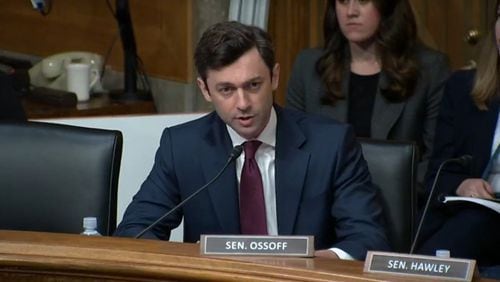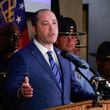Michael Gonzalez has lived in the shadow of the Atlanta University Center for nearly three decades. He has watched houses being boarded up, smelled the stench from trash-strewn lots and listened to the dangers of the streets.
“We hearing shooting all the time,” said Gonzalez, 29, who lives on Mitchell Street, two blocks from where a Spelman College sophomore was killed on Sept. 3. “You just brush it off.”
Gonzalez heard shots the night Jasmine Lynn was killed. A stray bullet struck Lynn as she and a friend walked along one of the public streets that crisscross the sprawling Clark Atlanta University campus.
She died near the AUC library, shared by students at Clark Atlanta, Spelman and Morehouse College. Her death drives home the fact that even Spelman students are at risk for violence almost from the moment they leave the college’s famous gates.
The colleges of the Atlanta University Center attract some of the finest students in the nation. The slumlord properties, abandoned houses and transitional neighborhoods nearby attract hookers, drug dealers and thugs.
University officials have wrestled with security issues for four decades as the once vibrant, prominent neighborhoods that served as a protective shell for students and professors have fallen into squalor. Many black professionals and homeowners have moved out, leaving lots and houses to fall into disrepair.
Carlton E. Brown has been Clark Atlanta’s president for less than a year. He wants more control of city streets that pass through the campus, which would enable university police to ban nonresidents, who now have access.
“We’re a campus in the middle of the high-crime section of the city,” he said. “I think Jasmine Lynn’s death brings that all into focus.”
Securing campus streets
The closed-campus idea resonates with Spelman President Beverly Daniel Tatum. Spelman’s campus has been gated since its inception. Clark Atlanta has closed parts of James P. Brawley Drive, and Morehouse has closed the section of Westview Drive that cuts through its campus.
“I absolutely think the streets need to be closed,” Tatum said. “That would benefit the entire Atlanta University Center community.”
While the all-male Morehouse College won’t completely gate its campus, President Robert Franklin wants increased ID checks, more surveillance cameras and improved lighting on and around campus.
All three of the colleges’ police chiefs are cooperating more to identify crime “hot spots.” Tatum said the police departments will soon use the same radio bandwidth.
Since January, there have been 29 violent crimes, including three homicides, in the Atlanta University district. That number doesn’t include the robberies, assaults and murders in the nearby neighborhoods of Vine City, College Town, Ashview Heights, Washington Park and Just Us.
At a recent forum for Atlanta mayoral candidates at Morehouse, students and residents urged the next mayor to address violent crime.
Morehouse student Brian Terrell recalled the murder of a college friend, Paul Martin, 19, who died sitting in his car outside a bar on Joseph E. Boone Boulevard — an especially tough section — last November.
“Basically it was execution-style,” Terrell said. “He was shot in the head.”
Colleges officials warn students to take precautions, such as traveling in groups late at night. “Part of our job is to protect them from their sense of invincibility,” said Brown, Clark Atlanta’s president.
He notes, however, that Lynn was following that advice when she was killed.
The shooting happened a block from where an Atlanta Technical College student was killed Aug. 20 in an apparent drug-related shooting at a student rooming house.
‘Two approaches’
City Councilman Ivory Young, who represents the district, said real security will come when the colleges work with neighborhood and business associations to clean up the squalor and create an environment of homeowners and families.
“There are two approaches,” Young said. “You put up a fence or you help bring back families who are vested in the neighborhoods and will help protect the streets. It is families who will restore the livable neighborhoods that the AU center had traditionally benefited from.”
The problem is similar for other urban schools, including Georgia Tech, which is separated from the historically black schools by high-crime neighborhoods, and Georgia State University downtown.
Ramshackle housing dominates the streets surrounding Clark Atlanta in particular. Weeds in front of some houses are so high as to obscure their porches. Some lots are strewn with household trash and others have burned houses.
The problem worsens in nearby neighborhoods. At the political forum, Washington Park Neighborhood Association President Alan Tingle said 125 of the area’s 651 homes are vacant and 15 are in such disrepair they need to be torn down.
Such houses are magnets for prostitution and crime, said Bill Cannon, an organizer of the Historic Westside Coalition of Communities. His message to the campuses: We’re all in this together.
“If we had put together a strong coalition — neighborhoods, colleges, churches and merchants — five years ago and worked toward a common purpose, I don’t think we would be having the problems were are having today,” Cannon said. “You cannot have an enjoyable college year if safety is a major issue. Our residents want to be comfortable enough to walk to the store or let their children ride their bikes on the sidewalk, but our neighborhoods haven’t been able to do that.
“Whether you’re a Washington High student or a Morehouse student or a parent driving a child to school, you should not have to pass prostitutes soliciting business. That should not be part of your routine.”
Colleges as partners?
All the colleges offer extensive community outreach programs for students. Morehouse and Spelman, which have deep endowments, offer scholarships through the Bonner scholars and leaders programs that require civic involvement. Isaiah Scott, a Bonner scholar, organized a food drive last year in which students swiped their meal cards and skipped the actual meal so that the school could donate the lunches to charity.
“When I got here, I was like, ‘Man, we’ve got to do something big,’ ” he said.
But Cannon, who is president of the Booker T. Washington Neighborhood Association, said such contributions, while admirable, aren’t enough.
What is needed, he said, is greater leadership from the college presidents, who get their phone calls returned by City Hall. They need to lead the battle for better code enforcement and city programs to clean up dilapidated housing or increases in police and fire protection, he said.
“There is only one way to eradicate a common problem and that is to have unity because at the end of the day, all the colleges are in our footprint,” he said. “What we can’t afford is to have any one of us place ourselves above the other whether it’s a community, a merchants association or a college campus.”
The colleges, Clark Atlanta’s Brown acknowledges, are the area’s anchor.
“There is no other higher education community on the planet Earth like this one,” he said. “It is time for the citizens and the institutions to address these issues. We are certainly going to do more than our fair share.”
About the Author





